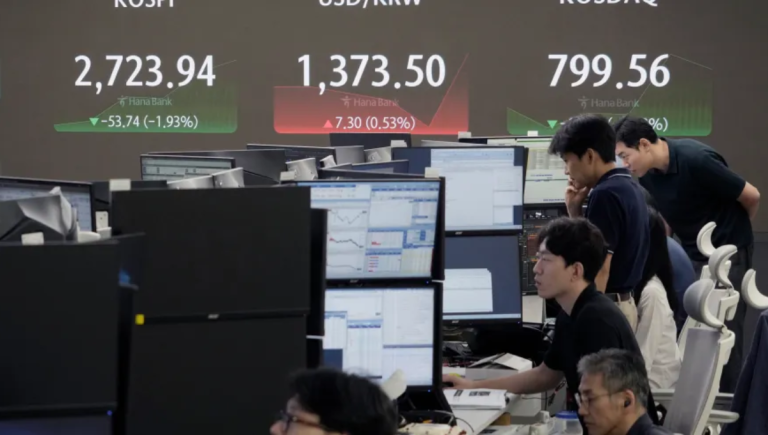The Asian stock markets suffered a setback and the Japanese stock market especially took a blow. The stock market in Tokyo, specifically the Nikkei 225 index, dropped by 4.5% one of the largest in the past few months. This decline replicated the tech-driven selloff observed on Wall Street that led to a selloff environment across the world markets.
Tokyo’s Stock Market Decline
Tokyo stock exchange was worst affected as the Nikkei 225 index plunged by 4.5%. This significant depreciation was mainly seen in technology stocks have large fluctuations in recent trading periods. Fluctuations on Wall Street also affected the stability of the technology sector leading to discomfort among Asian investors. The sharp decline in Tokyo was further compounded by the rattan that interest rates were on the rise and this would affect its economy. Market participants are getting more concerned with the ongoing and likely to further, monetary policy restrictions that would mean lower economic expansion and company profitability.
Tokyo’s Nikkei 225 and Other Asian Markets
The Tokyo Nikkei 225 in Tokyo declined by 4.6%, closing at 36,367.97. The steep decline was preceded by a pullback in the U.S. stocks. US shares were lower as speculations grew that the Federal Reserve might have lost the chance to reduce interest rates without impacting the economy positively. The recent benchmark interest rate adjustment by the central bank led to the appreciation of the Japanese yen vis a vis the US dollar. This could drag overseas earnings for major manufacturers such as Toyota Motor and impact foreign tourist influx. The Hang Seng in Hong Kong also fell 2.1% to 16,950.59 and declined share prices in other Asian markets.
Impact on Other Asian Markets
Tokyo’s sell-off paved the way for other markets in Asia that also suffered deep losses in their stocks. In Hong Kong, the Hang Seng Index fell by 3.2%, and South Korea’s Kospi index dropped by 2.9%. These declines are in synch with global market volatility and risk aversion after the high-tech and Net-stock meltdown in the US. The Shanghai Composite Index of China also endured a loss in smaller margins of approximately 1.5%. The decline in China is relatively smaller because its market was controlled and less technology-driven than that of Japan and other Asian countries.
Wall Street’s Performance and Nasdaq Composite
The decline in Asian markets was directly linked with Wall Street, where major indices dropped because of selling technology shares. Leading sectors that powered markets in recent years such as technology suffered heavy losses due to adjustments by investors over changing interest rates and growth outlook. The Nasdaq Composite, laden with technology companies, was worse off by 3% and led the decline. S&P 500 and Dow Jones Industrial Average also slid down and joined the global market selling trend.
Global Economic Landscape
Market risk sentiment has been dampened by factors such as concerns over economic growth decline, inflation, and interest rates. As a result, the investor is now more careful while investing because of the high risks involved due to the volatility of the market. The global economy is volatile, though some factors suggest stability while others point to the instability of the economies all over the world. Some patterns demonstrate remarkable upward trends while others hint at future issues like supply chain constraints and political strife.
Conclusion
Asian shares fell significantly, with the decline led by the 4.5% down in Tokyo, reviving the dependence on world markets and the influence of vast economies for example the United States. Thus, it is crucial to pay close attention to the actions taken by the central bank and various economic signs that point towards the further evolution of the markets.










